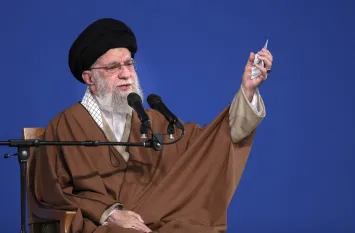
Amid the deepening military conflict with Israel, Iran’s Supreme Leader Ayatollah Ali Khamenei has reportedly shortlisted three clerics as potential successors, while choosing not to nominate his son Mojtaba.
The revelation, cited in a New York Times report, comes at a time when Khamenei is said to be operating from a secure underground bunker due to fears of an Israeli strike.
According to the report, Khamenei has informed Iran’s Assembly of Experts and senior clergy of his decision, urging them to select one among the three clerics if the situation demands a quick transition of power. The names of the three contenders have not been disclosed publicly.
What stands out, however, is the exclusion of his son Mojtaba Khamenei, who is also a cleric and has long been considered a likely successor. For years, speculation had mounted that Khamenei was preparing Mojtaba to take over the country’s highest post, a claim that now appears unfounded based on this latest development.
Sources cited by the report suggest the decision was influenced by Khamenei’s desire to preserve the legitimacy of the Islamic Republic’s leadership structure, which has historically rejected hereditary succession.
Wartime urgency driving succession talks
Under normal circumstances, the appointment of a Supreme Leader is carried out through a complex and secretive process led by Iran’s Assembly of Experts. However, the ongoing war with Israel and concerns over Khamenei’s safety have reportedly accelerated succession discussions.
Khamenei, 85, is believed to be sheltering in a fortified bunker due to rising fears of targeted attacks by Israel following Tehran’s continued involvement in the regional conflict. The urgency of identifying a successor appears to stem from the possibility of a sudden power vacuum should he be incapacitated.
Why are Iran and Israel at war?
The current Iran-Israel confrontation has its roots in decades of hostility. Following the 1979 Islamic Revolution, Iran declared Israel an illegitimate state and aligned itself with Palestinian resistance movements. Over the years, Iran’s support for groups like Hezbollah and Hamas, combined with its advancing nuclear programme, has heightened tensions.
Israel views Iran’s nuclear ambitions as an existential threat. While Iran claims its programme is peaceful, Israel and Western powers suspect military intent. This has led to repeated Israeli cyberattacks, sabotage operations, and airstrikes targeting Iran’s nuclear sites such as Natanz.
The situation has now escalated into direct missile exchanges and threats of all-out war, with both sides bracing for a prolonged conflict. Khamenei’s decision to preemptively plan for succession proves the severity of the crisis Tehran is facing.
